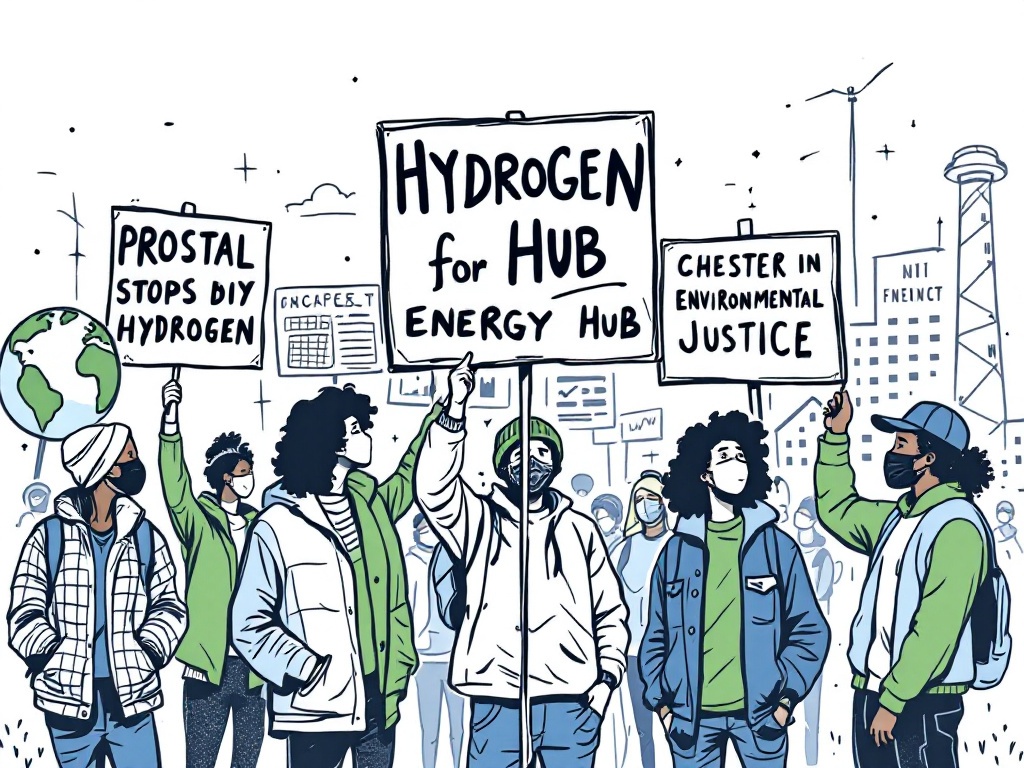U.S. Hydrogen Hubs: $7 Billion Clean Energy Gamble Faces Community Backlash

Philadelphia, Monday, 18 November 2024.
The Department of Energy’s ambitious hydrogen hub initiative promises 20,800 new jobs and potential industrial decarbonization, but faces fierce criticism from Chester, Pennsylvania residents, where asthma rates are double the state average. Local environmental justice advocates question whether this massive investment might actually increase emissions rather than reduce them.
Economic Implications and Job Creation
The U.S. Department of Energy’s $7 billion investment in hydrogen hubs is part of a broader strategy to decarbonize industries that contribute over 20% of the nation’s carbon emissions[1]. This initiative is projected to create approximately 20,800 jobs in the Delaware Valley, with 6,400 of these being permanent positions[2]. The Mid-Atlantic Clean Hydrogen Hub (MACH2), one of the key projects, is expected to receive $750 million in federal funding. Such substantial investment aims to boost local economies and revitalize manufacturing communities, particularly in states like Pennsylvania, where traditional industries have been declining[3].
Hydrogen’s Role in Decarbonization
Hydrogen is seen as a potential game-changer for decarbonizing heavy industries, which have lagged behind other sectors in reducing emissions. By providing a cleaner fuel alternative for ships, airplanes, and trucks, hydrogen could significantly cut down the carbon footprint of these high-emission industries[4]. However, the efficacy of hydrogen as a clean energy source is under scrutiny. Critics argue that the investment might divert funds from more effective decarbonization strategies and could potentially increase emissions due to production and transportation challenges[5]. Hydrogen production, primarily from natural gas, currently contributes significantly to greenhouse gas emissions, raising concerns about its environmental benefits[6].
Community Concerns and Environmental Justice
In Chester, Pennsylvania, where the MACH2 hub will be a focal point, residents express serious concerns about the health risks associated with hydrogen production and transportation. Environmental justice advocates highlight that Chester’s asthma rates are double the state average, suggesting a significant public health burden that could be exacerbated by industrial activities[7]. Community leaders like Zulene Mayfield criticize the project, arguing that it continues a pattern of environmental harm sanctioned by the state[8]. The potential for hydrogen leaks to increase greenhouse gases like methane and ozone further complicates the narrative of hydrogen as a ‘clean’ solution[9].
Future Prospects and Policy Challenges
The timeline for the hydrogen hubs spans the next 8 to 12 years, with the federal government spearheading efforts to integrate renewable energy sources into hydrogen production. Proponents argue that the hubs could revolutionize energy systems if they adhere strictly to sustainable practices, such as sourcing electricity from new renewable installations and matching energy use with availability[10]. However, as environmental policies face potential rollbacks under changing political climates, the future of such projects remains uncertain. Critics like Danny Cullenward emphasize the lack of a coordinated strategy, pointing out that substantial investments are being made without a clear roadmap for effective hydrogen utilization[11].